Scotland's Game - I Play For Money
- Published

Mo Johnston's capture by Rangers boss Graeme Souness sent shockwaves through Scottish football
In 1986, at the end of BBC Scotland's seminal social history of football in this country called 'Only A Game?' images of Kenny Dalglish in beautiful flight came on the screen, accompanied by the haunting lyricism of the narrator, William McIlvanney.
The epic five-part series concluded with upbeat words about the summer ahead. "The Scottish fans will go to the World Cup looking again for glory, travelling like the kings from the east in search of a miracle, following yet another star with a number on his back."
Thirty years later, there's a new series on what happened next. Vast in scale, the first episode of Scotland's Game aired on Thursday night. There will be three more programmes on successive Thursdays, each one charting the events of the wild decades that followed Scotland's adventure in Mexico.
Episode one is entitled 'I Play For Money', a quote from Graeme Souness, and it's an apt title because money is a key theme of the first programme - those who had it and those who claimed to have it and the madness that ensued.
Alex Ferguson had left Aberdeen for Manchester United, but where one big footballing name exited, another arrived.
Souness came in from Sampdoria to become player-manager at Rangers. A global superstar and a man bent on the most extraordinary revolution the Scottish game has ever known. "I was ready for it, I was fearless," he says. "We lit a fire."
Theirs burned longer and brighter than all others, but there was a magnificent glow elsewhere, too. The year after Souness arrived, Dundee United became only the fourth Scottish club to reach a European final.
They played 10 games to get to the Uefa Cup final of 1987 - Lens, Hajduk Split, Barcelona and Borussia Monchengladbach beaten along the way. They played two more in the final against Gothenburg, a spectacular if ultimately failed bid for extraordinary glory.
"I don't think I've ever seen a crowd stand like this for a defeated side," said legendary BBC commentator Peter Jones, of the Dundee United fans at Tannadice. That was some acclamation from Jones. He'd been covering football matches worldwide for 21 years at that point.
United used 21 players during the Uefa Cup campaign - 19 of them were Scots; 20 when you count Tommy Coyne, who was born in Dundee but declared for the Republic of Ireland.
Maurice Malpas captures the mood of the era at Tannadice. "Everyone was battered with the same brush," he says of the remarkable footballing despot that was his manager, Jim McLean.
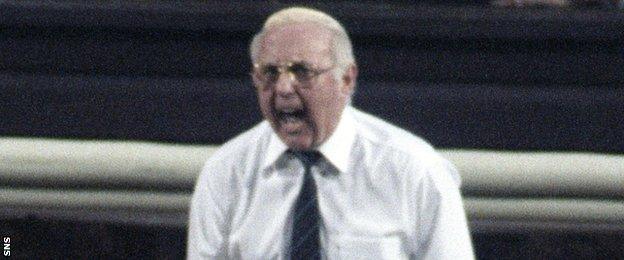
McLean managed United for 22 years
The culture McLean created was ruthless. "We had experienced players who would literally punch you if you weren't doing the right things," Malpas recalls. "There was none of this molly-coddling. You got a whack."
McLean's ambition didn't begin and end with the whitewash on the park. Dundee United tried to take over Dundee.
Financial pressure made McLean do it and he was within a day or two of pulling it off. The tumult in the City of Discovery was matched in the capital. The story of Wallace Mercer's attempt to buy Hibernian is well-known but every revisit of the narrative sends a chill down the spine.
Even in these early years of the 30-year story the types of characters who are emerging are jaw-dropping. David Duff, a director at Hibs, and his chum, David Rowland, a tax exile. Together they took over Hibs and persuaded fans to invest £3m in a share issue.
The money went into propping up Rowland's chronically loss-making restaurant chain in the south of England. Hibs went into receivership. Enter Mercer and cut to Alex Salmond talking about Mercer's bid to gobble up Hibs. "Totally a disastrous idea," says the former first minister.
Hearts owner Wallace Mercer's attempt to take over Hibernian
The 'Hands Off Hibs' campaign was fierce and is applauded by Rod Petrie, the current chairman.
The footage of Mercer bemoaning "parochial" attitudes is mind-boggling. How did he think it would end? Garlands in the post rather than bricks through his windows?
From John Robertson, the Hearts icon, there is the story of half-time in the Edinburgh derby of the time. Tensions had erupted in the opening half. There'd been pitch invasions. Police were heavy-handed and panic-stricken.
"It was a horrible atmosphere," says Robertson. "Hibs fans were going bananas and rightly so. We were the anti-Christ."
Hearts were three goals up at the break. Senior policemen enter the Hearts dressing room asking the rampant Jambos to ease up in the interest of public order. "If you can help it, don't score," the Hearts players were told. The delegation left and, as Robertson puts it: "We shut the door and said, 'Nah, that ain't happening guys'."
Mercer failed and so did Duff. He went to prison in 1993 for fraud after swindling financial institutions out of hundreds of thousands of pounds.
The money theme carries on in Scotland's Game. David Murray purchased Rangers in 1988.
Big signing followed big signing. "Scotland was a phenomenal place to be," says Terry Butcher, just one of the marquee names brought up from England. For a Rangers fan there was scarcely a better time to be alive.
"Rangers are the biggest club in Britain," says Murray in archive footage. "People better realise that. Our ambition holds no bounds."
Murray was the picture of hubris, but he subscribed to the belief that it ain't bragging if you can back it up. And back it up he did.
The revolution at Ibrox went into overdrive when Souness ripped apart the shameful anti-Catholic philosophy at the heart of the club - as he signalled he would on his first day - and signed Mo Johnston from under Celtic's nose.
Even now, the journalists who covered the story shake their heads at the magnitude of it. In Scotland's Game there is a brilliant contextualised segment from the historian Professor Tom Devine on the back story of sectarianism in Scottish society and how the Johnston thunderbolt was an illustration of how sectarianism was dying even then.
Devine said that temperature of the times was changing. Veteran broadcaster Archie Macpherson calls the Johnston saga "transformational".
The writer, playwright and Rangers fan Alan Bissett says: "This whole thing that there was people burning scarves outside Ibrox - your nutters - the very few nutters who only saw the religious aspect. But they weren't anything like the majority - almost every Rangers fan I knew was absolutely delighted, because it was one in the eye for Celtic. It was sort of a signal to Celtic - even Catholics want to play for us - that's how good we are now."
Rangers were sensational and unstoppable while their Glasgow rivals were on their knees. Celtic came within hours of going out of business under the old family dynasties. The Sunday Mail had delivered their infamous back page by then - a picture of a hearse parked outside the stadium with Celtic RIP as the headline.
A saviour was needed and he appeared at the 11th hour. Looking at the footage of Brian Dempsey, the Celtic director, delivering his valedictory speech - "The game is over, the rebels have won" - the eye is drawn to Fergus McCann, standing deadpan beside him.
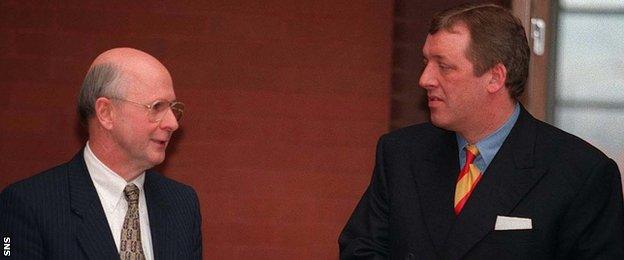
The leadership styles of McCann and Murray could scarcely have been different
There is whooping and hollering, huge and understandable displays of relief and emotion all around him, but McCann is unmoved, a study of dispassion and focus or, perhaps, shyness. He was always hugely formidable but never comfortable in the limelight.
He tells Scotland's Game: "I had £11m sitting in an account to show [the bank] that the funds were there. I was not an illusion."
McCann was Celtic's Messiah - even though many didn't appreciate him until years later - and about as different to Murray as two people could possibly be. McCann was frugal and didn't need to be anybody's friend. Murray was flash and top of the league. McCann refused to play Murray's game in the media or the transfer market. The press, and Celtic's own supporters, rounded on him. He stayed true to his plan of rebuilding the club - and he took a kicking for it.
Roger Mitchell, former chief executive of the Scottish Premier League, speaks an undeniable truth about the Murray versus McCann dynamic in the media.
"The old journalists got sweeties from David, and hence David was the king," says Mitchell. "And David's challenger, Fergus, was the village idiot. Fergus was never prepared to try to compete by giving sweeties to the media. And if you don't give sweeties to the media, they don't like you and they hurt you and they treat you badly."
Former Celtic chief executive Fergus McCann remembers the dramatic events of 1994
Jock Brown, Celtic's general manager of the time, put it succinctly: "David Murray had the media in his pocket."
The practice has been written into legend as 'succulent lamb' - a phrase used in a newspaper article at the time.
Celtic won the league title in 1998, thereby stopping Rangers from completing 10 in a row. Murray's ego was dented. He soon set about an £87m spending splurge to restore himself to the top of Scottish football. Rangers fans loved him for it.
McCann, meanwhile, was booed by his own supporters at the unveiling of the league championship flag at Celtic Park. "People saying, 'well you know, just spend the money Fergus, spend the money Fergus'," recalls McCann.
So much of Scottish club football was becoming distorted. A twisted logic reigned - and as the 30-year story continues that twisted logic would exact a very, very heavy price.
The first part of Scotland's Game will be broadcast on BBC One Scotland on Thursday at 21:00 BST.
- Published23 August 2016
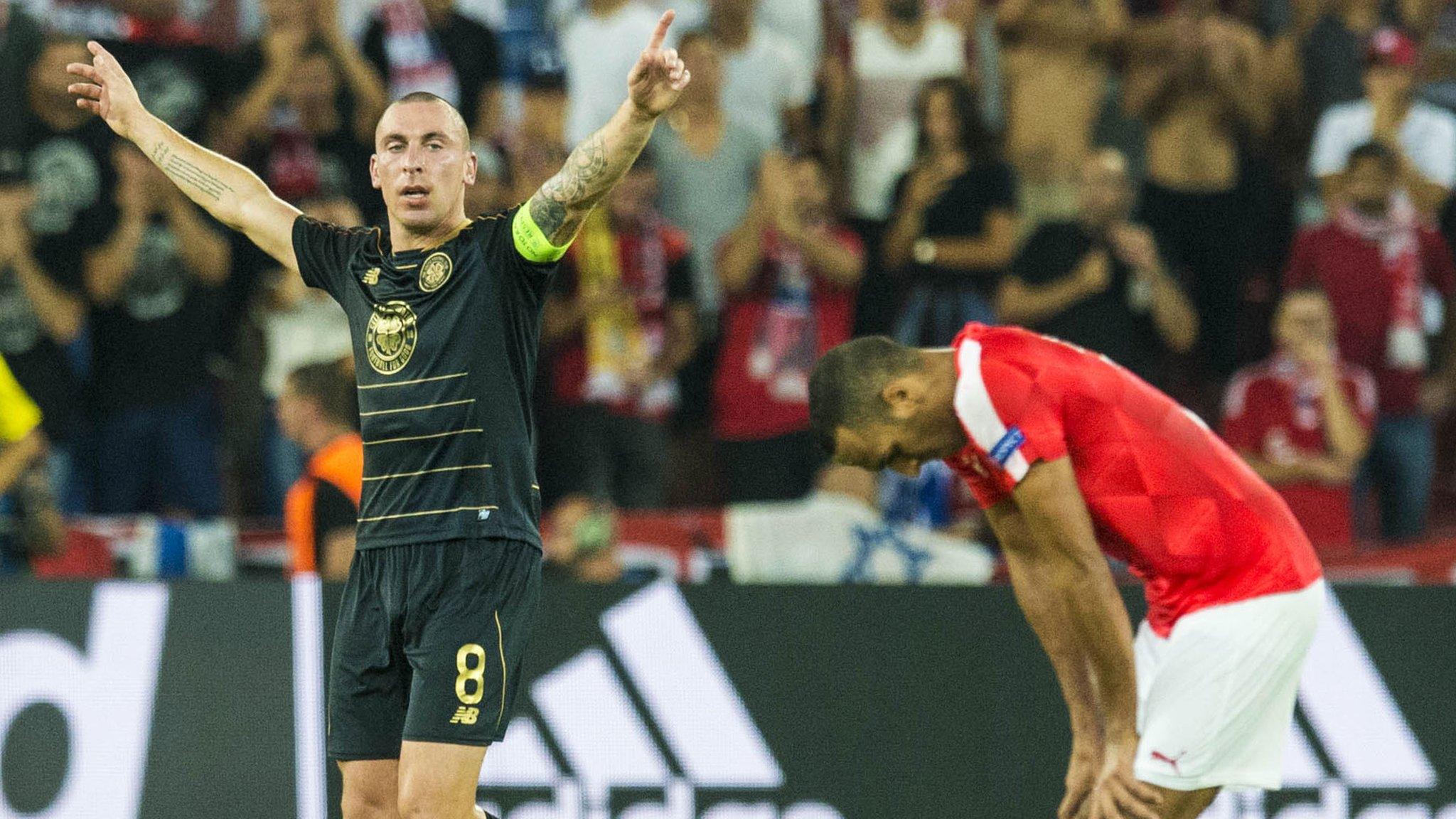
- Published23 August 2016
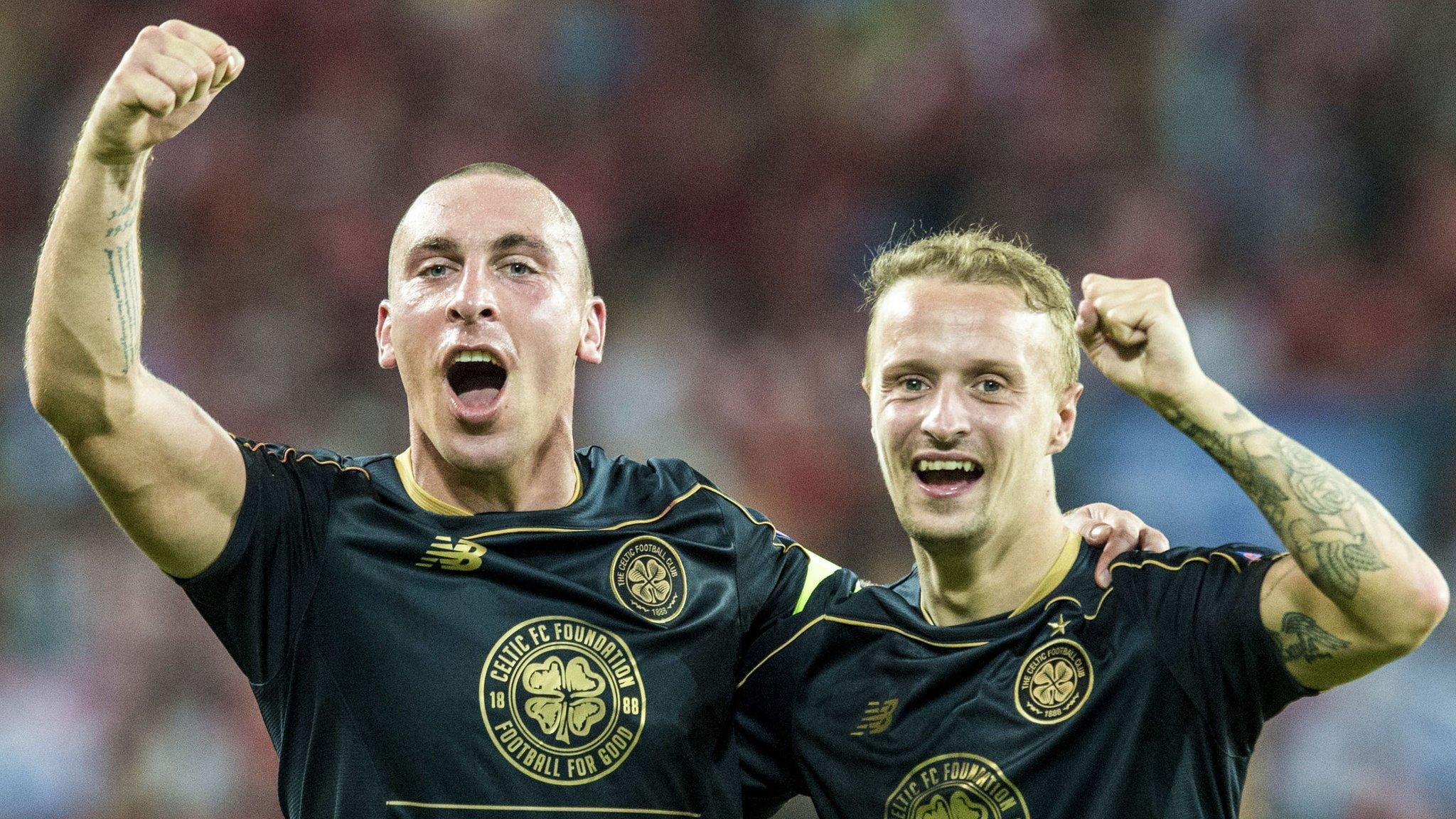
- Published22 August 2016
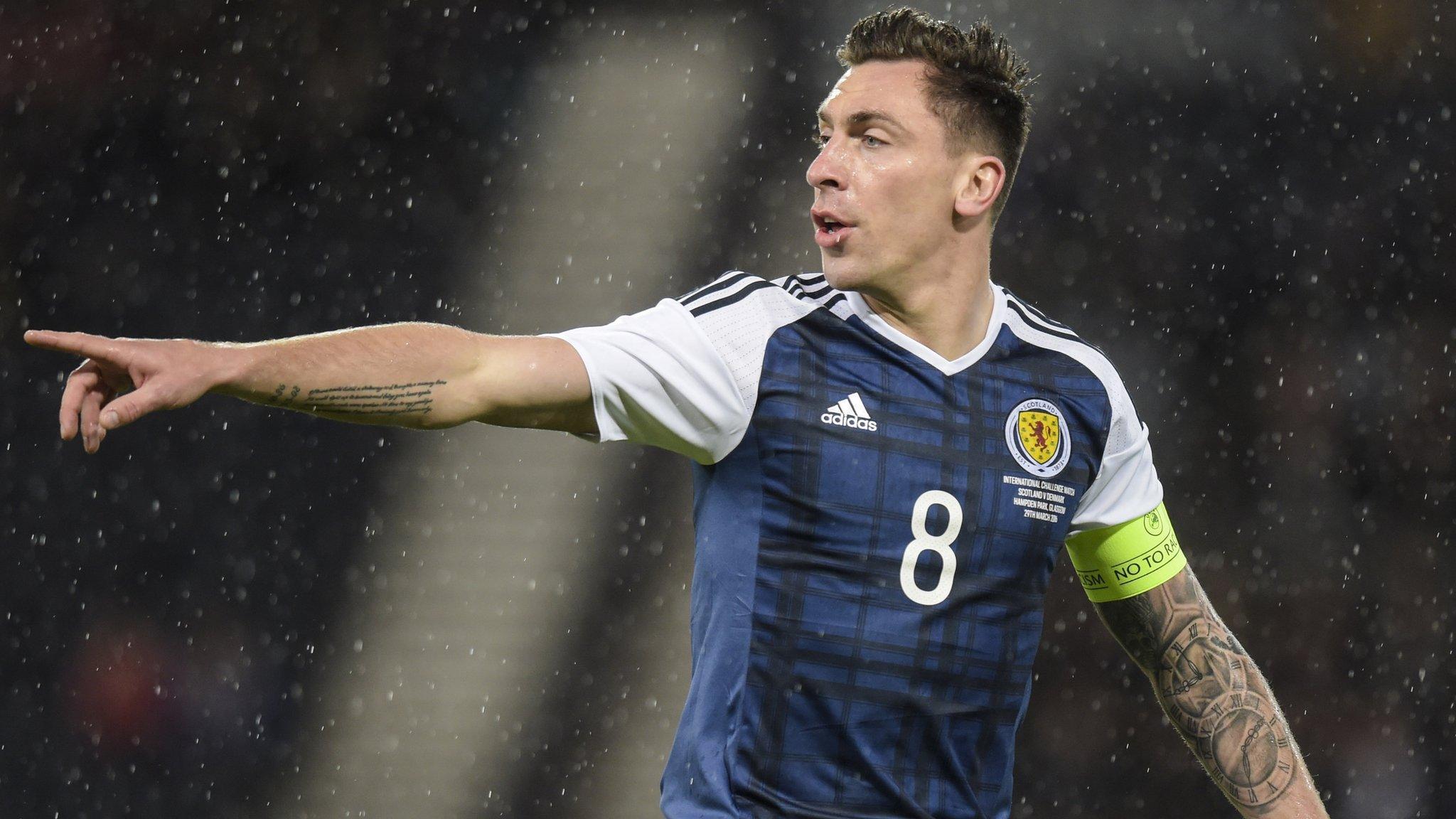
- Published7 June 2019

- Published14 January 2018